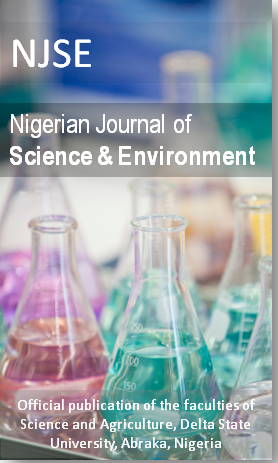
NIGERIAN JOURNAL OF SCIENCE AND ENVIRONMENT
Journal of the Faculties of Science and Agriculture, Delta State University, Abraka, Nigeria
ISSN: 1119-9008
DOI: 10.5987/UJ-NJSE
Email: njse@universityjournals.org
THE ZOOPLANKTON OF RIVER ADOFI IN DELTA STATE OF NIGERIA
DOI: 10.5987/UJ-NJSE.16.006.2 | Article Number: 917A9A6 | Vol.12 (2) - September 2013
Keywords: zooplankton, composition, abundance, diversity, River Adofi
Some physico- chemical parameters were investigated alongside with the zooplankton of Adofi
River between June and November 2009. The nutrient levels detected were significantly very high.
Two taxonomic groups were identified; the rotifera and the Cladocera. The rotifers were the most
occurring species (15) constituting about 98.7% of the total zooplankton species while the Cladocera
recorded only two species with 1.3%. Of the phylum rotifera, the family Brachionidae recorded
six species constituting 40% of the total number of species while the other three families
Lecanidae, Proalidae and Trichocercidae had three species(20 %) each. Despite the equal species
composition of the three families, the family Proalidae(39%) was almost of equal abundant composition
with the family Brachionidae(39.4%} while the families Lecanidae and Trichocercidae
contributed 12.9%, and 7.1% respectively. The two species of Cladocera recorded were Ceriodaphnia
audragula contributing 1% abundance and Diaphanosoma leuchen having 0.5% abundance.
No significant difference was found between the physico – chemical parameters. However,
significant difference was found between the physico- chemical parameters and the zooplankton
abundance (P<0.01).
Adeniji, H. A. (1973). Preliminary investigation
into the composition and variation
of the planktons of lake Kainji, Nigeria.
Geophysical Monograph Series,
17: 617 – 619.
Adesalu, T.A. (2010). Phytoplankton dynamics
of river Oli in kainji lake national
park, Nigeria during dry season. International
Journal of Botany 6: 112-
116.
Akoma, O. C. (2008). Phytoplankton and Nutrient
Dynamics of a Tropical Estuarine
System, Imo River Estuary, African
Research Review 2: Pp. 253 – 264.
Ambasht, R. S. and Ambasht, P. K. (2005).
Environment and pollution (4th Ed.)
CBS publishers, New Delhi.
Chindah, A. C. and Braide, A. S. (2004).
The physiochemical Quality and
phytoplankton community in Tropical
Waters: A Case Study of 4 Biotopes in
the lower Bonny River, Niger Delta,
Nigeria. Caderno De Pesquisa Ser.
Bio., Santa Cruz do sul, 16 (2): 7 – 35.
Davies, O. A., Abowei, J. F. N. and Otene,
B. B. (2009) Seasonal Abundance and
Distribution of plankton of Minichinda
Stream, Niger – Delta, Nigeria. European
Journal of Scientific Research.
26 (4): 490 – 498.
Egborge, A. B. M. (1981). The composition,
seasonal variation and distribution of
zooplankton in Lake Ajesire, Nigeria.
Revue de zoologie africaine 95: 136 –
180.
Guy, D. (1992). The ecology of fish pond
ecosystem with special reference to
Africa. Pergamon Press, New York.
Iloba, K. I. (2002). Vertical distribution of
the Rotifera in the Ikpoba Reservoir in
Southern Nigeria. Tropical freshwater
Biology 11: 69 – 89.
Imevbore, A. M. A. (1969). Planktonic algae
of Eleiyele Reservoir. Nigerian Journal
of Science. 2: 85 – 90.
Kemdirim, E. C. (2000). Diel Rhythm of
Plankton and Physiochemical parameters
in Kangini Reservoir, Kaduna
State, Nigeria. Journal of Aquatic Science
15: 35 – 39.
King, R. P. and Nkata, N. A. (1991). The
states and seasonality in the physiochemical
Hydrology of a Nigerian
Rainforest Pond. Journal of Hiamology
52: 1-12.
Mustapha, M. K. (2009). Influence of watershed
activities on the water quality and
fish assemblage of a tropical African
reservoir. Turkish Journal of Fisheries
and Aquatic Sciences Vol. 9.
Mustapha, M. K and Omotoso, J.S (2005).
An Assessment of the Physiochemical
parameters of Moro Lake, African
Journal of Applied Zoology and Environmental
Biology, Vol. 7.
Okogwu, O. and Ugwumba, A. O. (2005).
The hydrology and phytoplankton of
Ologe Lagoon Southwest Nigeria.
Journal of Sustainable Tropical Agricultural
Research. 13: 1 - 6.
Oladipo, A E and Williams, A. B (2003).
Physiochemical parameters and phytoplankton
community of some selected
fish ponds in Lagos state, Nigeria.
Journal of Aquatic Sciences 18 (1): 53
– 57.
Opute, F. I. (1991). A checklist of the freshwater,
brackish, and marine phytoplankton
of the Warri/Forcados estuaries
of Southwestern Nigeria. Nigerian
Journal of Botany 4: 227 – 254.
Parsons, I. R. (1980). Zooplankton production.
In: Fundamentals of Aquatic ecosystem
(Barnes R. and Mann, K. H.
eds). Blackwell Scientific Publications,
London.
Prepas, E. E., Pinel-Alloul, B. Planas. D.
Methot, G. Paquet, S and Reedy, S.
(2001). Forest Harvest impacts on water
quality and aquatic biota on the Boreal
plain: introductions to the TROLS
lake program. Canadian Journal of
Fisheries and Aquatic science 58: 421
– 436.
Pussy, B and Anrtothington, A. and
Arthington, A. H. (2003). Importance
of the riparians zone to the conservation
and management of fresh water
fish: a review. Marine and Fresh Water
Research 54: 1 – 16.
Raymond, E. G. (1986). Plankton and Productivity
in Oceans. 2nd ed.n. Vol. 1,
Iloba & Akawo
42
Nigerian Journal of Science and Environment, Vol. 12 (2) (2013)
Pergamon Press. London
Talling, J. F.,(1957). The longitudinal succession
of water characteristics in whiter
Nile. Hydrobiologia. 9: 73 – 89.
Thurman, H. V. (1997). Introductory Oceanography,
Patience Hall College, New
Jersey
Trivedi, R. K., Guruna, V. Das, B. K. and
Rout, S. K. (2003). Variations of
plankton population of two hill
streams of Darjeeling district, West
Bengal. Environment and Ecology 21:
50 – 53.
Tucker, J. W. (1992). Feeding intensively
cultured marine fish larvae. P. 129 –
146. In Proceedings of Aquaculture
Nutrition Worship Salamander Bay,
(Allan, G. I. and Dall eds). 15 – 17th
April, 1991. NSW Fisheries, Brackish
water fish culture research stations,
Salamander Bay, Australia.
Westerlake, D. F. (1980). Primary production
In: The functioning of freshwater
ecosystems. (Lecren, E. D. & Lowe
McConnell, R. H. eds.). Cambridge
University Press. International biological
programme, 122: 414 – 446.
Yakubu, A. F., Sikoko, F. D., Abowek, J. F.
N. and Hart, S. A. (2000). A comparative
study of phytoplankton communities
of some rivers, creeks and
burrow pits in the Niger Delta Area.
Journal of Applied Science, and Environmental
Management, 4(2): 41 – 46.
